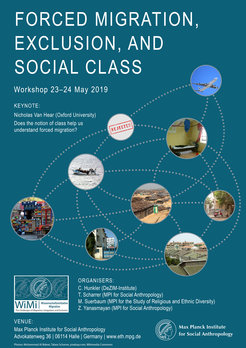Forced migration: few opportunities for the poor
A workshop entitled “Forced Migration, Exclusion, and Social Class” will take place at the Max Planck Institute for Social Anthropology (MPI) on 23 and 24 May 2019. Participants will examine the ways that the prior economic and social background of refugees affect what opportunities are available to them during their flight and after arrival in a new country. The workshop, which will be held in English, was organized as part of the research initiative ‘Challenges of Migration, Integration and Exclusion’ (WiMi) financed by the Max Planck Society.

The high cost of fleeing
“Forced migration often means that people lose their property, their social position, and their networks. If you have to flee, at the beginning you have to start over at the bottom,” explains Dr. Tabea Scharrer, a research fellow at the MPI and co-organizer of the workshop “Forced Migration, Exclusion, and Social Class”. For many people who have to leave their homelands, this is a traumatic experience. But some people cope with this and the uncertainties of their new surroundings far better than others. One major factor is the costs linked to fleeing the country. Those who have little money are much more unlikely to arrive at their destination at all. But people desperate enough to flee need more than just funds: they also require knowledge in order to successfully navigate the many dangers, obstacles, and closely guarded borders.
Starting over from nothing
“In the research on forced migration there have been few systematic studies of how the original material, social, and cultural position of refugees influence the subsequent course of their lives,” notes Scharrer. “But there is much empirical evidence suggesting that social-economic position plays a larger role in the different ways of living of refugees than their ethnic and national origins.” Some of the decision-making processes about asylum applications, for example, are organized in such a way that individuals with access to information and legal support have better chances of their claim being approved than individuals with neither knowledge nor money. But this does not mean that people with access to extensive resources automatically have an easier start in their new life. Scharrer explains: “Most of the time a person’s social status is significantly changed by becoming a refugee. For example, educational qualifications are often not recognized, and this devaluation of one’s life and accomplishments is very frustrating, especially (but not only) for those who are highly qualified.”
Anthropological case studies
The workshop will included presentations of case studies on the situation of refugees from Chile, North Korea, Syria, Burundi, the Democratic Republic of the Congo, and Somalia who are now living in the EU, South Korea, Turkey, Tanzania, or Kenya. The focus of these studies is to examine how these refugees manage to come to terms with these new social spaces and embark on new lives.
Studying global social change
The Max Planck Institute for Social Anthropology is one of the world’s leading centres for research in socio-cultural anthropology. It was established in 1999 by Chris Hann and Günther Schlee, and moved to its permanent buildings at Advokatenweg 36 in Halle/Saale in 2001. Marie-Claire Foblets joined the Institute as Director of the Department ‘Law & Anthropology’ in 2012. Common to all research projects at the Max Planck Institute is the comparative analysis of social change; it is primarily in this domain that its researchers contribute to anthropological theory, though many programmes also have applied significance and political topicality. Fieldwork is an essential part of almost all projects. Some 230 researchers from over 30 countries currently work at the Institute. In addition, the Institute also hosts countless guest researchers who join in the scholarly discussions.
Max Planck Society initiative WiMi
The Challenges of Migration, Integration and Exclusion (WiMi) is a 3-year research initiative (2017-2020) financed by the Max Planck Society and led by Prof. Dr Marie-Claire Foblets (Max Planck Institute for Social Anthropology, Halle/Saale) and Prof. Dr Steven Vertovec (Max Planck Institute for the Study of Religious and Ethnic Diversity, Göttingen). The project is coordinated by Dr Zeynep Yanasmayan, Max Planck Institute for Social Anthropology (Halle).
This collaborative project involves researchers from six Max Planck Institutes:
Max Planck Institute for Comparative Public Law and International Law (Heidelberg)
Max Planck Institute for Demographic Research (Rostock)
Max Planck Institute for Social Law and Social Policy (Munich)
Max Planck Institute for Human Development (Berlin)
Max Planck Institute for Social Anthropology (Halle)
Max Planck Institute for the Study of Religious and Ethnic Diversity (Göttingen).
More information on the WiMi project
Workshop programme
Contacts for this press release
Dr. Tabea Scharrer
Max Planck Institute for Social Anthropology
Department ‘Integration and Conflict’
Advokatenweg 36, 06114 Halle (Saale)
Tel.: 0345 2927-148
E-mail: scharrer@eth.mpg.de
https://www.eth.mpg.de/scharrer
Dr. Zeynep Yanasmayan
Max Planck Institute for Social Anthropology
Department ‘Law & Anthropology’
Advokatenweg 36, 06114 Halle (Saale)
Tel.: 0345 2927-318
E-mail: yanasmayan@eth.mpg.de
https://www.eth.mpg.de/yanasmayan
PR contact
Stefan Schwendtner
Press and Public Relations
Max Planck Institute for Social Anthropology
Advokatenweg 36, 06114 Halle (Saale)
Tel.: 0345 2927-425
E-mail: schwendtner@eth.mpg.de
https://www.eth.mpg.de
